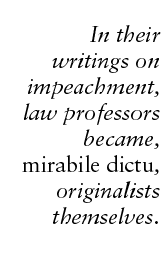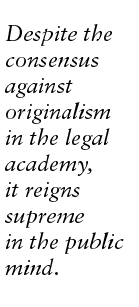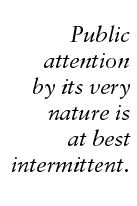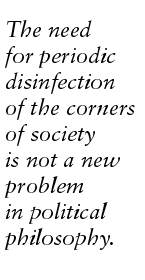- Law & Policy
- The Presidency
- Politics, Institutions, and Public Opinion
MOMENTOUS PUBLIC ISSUES, like impeachment, have at least this virtue: They promote political accountability by forcing citizens to take positions that will be remembered. Such public reasoning carries with it the risk of public exposure. During President Clinton’s impeachment, certain feminists became poster girls for hypocrisy because their support for Clinton conflicted with their previous positions, such as their attacks on Clarence Thomas. But there is a second kind of exposure that can be equally important. Under outside scrutiny, some groups — particularly intellectuals — forsake the style of reasoning they apply regularly in the seclusion of their own salons. This divergence between private and public intellectual persona can reveal the frailty of the ideas by which such groups make an academic living.
As a law professor who testified before the House Judiciary Committee on the subject of impeachment, I had firsthand knowledge of the incongruity of most law professors’ approach to this issue. Of course, I was not surprised that my colleagues almost universally opposed the impeachment of the president. Just as it was said in the late nineteenth century that the Anglican Church was the Conservative Party at prayer, our universities today are the Democratic party at play. Indeed, the more than 6 to 1 statistical imbalance in the legal academy between Democrats and Republicans may not fully capture the vigor of its commitment to this president because law professors are most passionate on the subjects of abortion on demand and racial and ethnic preferences — the two issues on which Clinton is most reliably left-wing.
What was curious about my colleagues’ presentations was not their bottom line but their methodology. In their academic writings, most professors of constitutional law deploy a signature theory of constitutional interpretation of their own devising, usually some iteration of what are amusingly called "non-interpretative" theories of interpretation. For modern constitutional theorists, the current meaning of the Constitution must be divined through liberal moral theory, or generated by a close study of watershed elections, or grasped by "translating" the Framers’ commands to a new code appropriate to our era.
For instance, Laurence Tribe, one of those who argued against impeachment at the hearing, defends Roe v. Wade in his constitutional law treatise on the grounds that the Constitution must be construed to protect fundamental rights even if these rights are not enumerated in the Constitution. He then contends that the right to an abortion is fundamental on the basis of a farrago of value judgments also nowhere implied by the Constitution, such as the claim that legal restrictions on abortion "subordinate women to men." Ronald Dworkin, perhaps the most celebrated legal theorist alive today and a signer of the law professors’ letter opposing impeachment, is able to discover abortion rights in the Constitution even without appeal to unenumerated rights. For him, the Constitution consists of a set of moral principles so broad as to permit the Supreme Court to set itself up as a commission of moral inquisition on all legislation. To condemn the constitutionality of abortion regulations, he musters moral judgments similar to those of Professor Tribe — judgments that are incontestable only in the sense that an overwhelming majority in the academy would never dare question them.
rights in the Constitution even without appeal to unenumerated rights. For him, the Constitution consists of a set of moral principles so broad as to permit the Supreme Court to set itself up as a commission of moral inquisition on all legislation. To condemn the constitutionality of abortion regulations, he musters moral judgments similar to those of Professor Tribe — judgments that are incontestable only in the sense that an overwhelming majority in the academy would never dare question them.
In contrast to the popularity of "non-interpretative" theories, like those of Dworkin or Tribe, the legal academy almost universally derides originalism — the view that the Constitution should be interpreted according to its original meaning — as a dead hand constraining social progress. For instance, to an originalist the Constitution itself suggests that capital punishment must be permissible under at least some circumstances, because it provides that, "No one shall be held to answer for a capital crime unless on a presentment or indictment of a Grand Jury" and that, "no one shall be deprived of life, liberty or property without due process of law." Dworkin, however, argues that the Eighth Amendment can still prohibit capital punishment because the ban on "cruel and unusual punishment" reflects our evolving standards of decency. According to the professor, the content of these new standards can be intuited by judges and professors even if their intuitions conflict with those of the overwhelming majority of people, who support the death penalty.
The disdain for originalism carries over from the constitutional questions involving rights to those involving the structure of the government. Many of those who signed the letter opposing impeachment have also argued that the Supreme Court was correct to have discarded the original understanding of federalism. For instance, Professor Lawrence Lessig of Harvard, yet another signer, has argued that federalism must be "translated" so as to be compatible with a more centralized state, which, in his view, is necessary to regulate modern society.
In their writings on impeachment, however, law professors became, mirabile dictu, originalists themselves. Without so much as an explanation, let alone an apology, for their transformation, they wove their arguments almost exclusively from text and history.
Of course, being rusty at the mere carpentry of legal analysis, they often misused the most elementary of tools of the originalist method. The professors misconstrued language. For instance, their letter against impeachment argued that the phrase "high Crimes and Misdemeanors" was wholly or largely directed to acts committed in a public capacity, because the adjoining words in the clause governing impeachment, "Bribery" and "Treason," defined acts necessarily committed in the public capacity. This was obviously an error of interpretation. If an executive branch official passed money to influence a judge for a private matter, his act would nevertheless constitute bribery. As for treason, tell the Rosenbergs that it is a crime that can only be committed in a public capacity.
money to influence a judge for a private matter, his act would nevertheless constitute bribery. As for treason, tell the Rosenbergs that it is a crime that can only be committed in a public capacity.
The professors also failed to consider very pertinent evidence from the era of the Framing about the gravity with which perjury was regarded. John Jay, the first chief justice of the United States, said of perjury flatly, "there is no crime more extensively pernicious to society" because it undermines the system of justice at the heart of a civic republic.
As hypocrisy is the tribute that vice pays to virtue, so a faulty reading of text and feeble historical research became the tribute that these liberal law professors paid to originalism. But why did such professors, in their testimony and op-eds and endless media appearances, remain faithful to originalist methodology at all, when they ridicule it in their scholarship?
Since it was clearly not by choice, it must have been a decision forced by circumstance. If they had placed their arguments about impeachment in the context of their own often conflicting theories of constitutional interpretation, they themselves would have been ridiculed by members of Congress, because their theories would have been so obviously at odds with common sense. Impeachment was unlike academic debates and even judicial proceedings in one salient and salutary respect: The public was actually paying some attention; therefore, arguments that flew in the face of our common pool of reasoning would have been heavily penalized.
The impeachment hearings are not an isolated example of legal theorists abandoning their own theories in public forums. For instance, Bruce Ackerman, the Yale constitutional theorist, has long contended that the Constitution can be amended outside of the formal process spelled out in the document. In the professor’s view, we can dispense with the fusty process of requiring two-thirds majorities in the Congress and ratification by three-fifths of the states. Instead, we can amend by arriving at a revolutionary "constitutional moment," at which time Congress and the president act in a way that was previously unconstitutional and their action is subsequently ratified by their reelection.
In the Harvard Law Review, Ackerman contended that the North American Free Trade Agreement (NAFTA) could be given effect by ordinary legislation instead of requiring ratification by two-thirds of the Senate, because the treaty ratification requirement had been made a dead letter by a previous "constitutional moment" earlier in this century.  Appearing before Congress, however, he did not advance under his own academic coat of arms but made instead a weak textual argument on behalf of NAFTA’s constitutionality. The reason for his reticence is clear: Many senators and reporters would have recognized that Professor Ackerman’s endorsement of ad hoc populist revisions of our founding document discards constitutional restraints when they are most needed — in moments of popular passion. The whole point of a Constitution is, in the memorable words of Justice David Brewer, to have "Philip sober control Philip drunk."
Appearing before Congress, however, he did not advance under his own academic coat of arms but made instead a weak textual argument on behalf of NAFTA’s constitutionality. The reason for his reticence is clear: Many senators and reporters would have recognized that Professor Ackerman’s endorsement of ad hoc populist revisions of our founding document discards constitutional restraints when they are most needed — in moments of popular passion. The whole point of a Constitution is, in the memorable words of Justice David Brewer, to have "Philip sober control Philip drunk."
The impeachment-hearing conversion of law professors has many lessons. The most obvious is that, despite the consensus against originalism in the legal academy, it reigns supreme in the public mind. The Constitution is a recipe for government, and the common man, unschooled in the intricacies of theory, understands that to follow a recipe you need to understand it according to the meaning it had to those who formulated it. Otherwise you may get an utterly different dish — one prepared to the perhaps eccentric taste of the cooks. One further argument intuitively understood is that originalism is the only possible default rule for interpretation. Without originalism, our law professors could have spent the entire debate in fruitless disagreement about which of their many "non-interpretative" theories to choose.
But there are also larger lessons about the ability of public attention to act as a counterweight to the bizarre flights of fancy that are now pandemic in the legal academy. Recently one prominent left-wing scholar denied that conservatives face discrimination in the legal academy because they are conservatives. Instead, he contended that conservatives were disfavored because they keep working on the boring theory of originalism in constitutional law and textualism in statutory interpretation rather than working to formulate new, "cutting-edge" theories.
This professor was inadvertently revealing what motivates many legal academics — the taste for novelty rather than the love of truth. It is of no consequence to those ensconced in tenure that each novel theory has itself been shown wanting. Indeed, these flaws present an opportunity for further critique and yet another parlor game. The public may not be experts but they recognize that more is at stake in legal analysis than the opportunity to amuse and dazzle your friends. Many of the theories offered in the academy are so patently dangerous to legal regularity that they dare not speak their name in public.
THE PUBLIC ARENA ALSO makes it difficult for other kinds of academics to spout nonsense. For instance, academic history today is affected by all sorts of fads, but only academics who eschew such theories can make a lasting impression on the public imagination. David Fromkin’s recent book, The Way of the World (Knopf, 1998), presents a history of the entire progress of mankind in some 222 pages. He proceeds on a theory of human motivations and environmental influences that would have been immediately recognizable to the reader of Gibbon, Tacitus, or Thucydides. While The Way of the World offers a deeper explanation of a much vaster swath of human enterprise than most readers could likely provide if asked to do so, the book resonates with our experience and comports with the kind of explanations we give for contemporary events around us. Fromkin is thus able to advance a narrative and persuade us to take the time to read it in a mere couple hundred pages.
In contrast, a feminist theory of history proceeds on claims of patriarchy and conspiracy that we do not apply in daily life. Such histories do not move the general public or sustain a comprehensive narrative. It is hard to imagine a feminist interpretation of human progress that covers the same terrain as Fromkin in the same 222 pages. There would be too much explaining to do; events and actions that could be readily understood as straightforward would have to be tortured into yielding esoteric meaning. This is the reason those caught up in the academic fashion of the moment choose obscure subjects and are published only by the academic press. It is a sad truth that much of what is written in our universities today is based on the occult ideas of such narrow sects that they could never attract the slightest amount of public interest.
Of course, it is not only academics whose practices might be improved by the periodic glare of publicity. Unchecked self-interest encourages many professions to use government and non-profit institutions in ways that are contrary to the public interest. For instance, ordinary lawyers have a tendency to prefer an unsound legal methodology — one that preserves discretionary authority in the courts. If the judiciary is not constrained by clear rules, lawyers become more powerful and command higher fees because they are positioned to guide the perplexed through the exercise of this discretion. As a result of this self-seeking will of the legal class, law has become much less fixed, certain, and constraining, making it a less efficient method of resolving human disputes.
Lawyers and judges are able to transform jurisprudence to meet their needs, rather than the needs of society, because most of the time society simply isn’t paying much more attention to them than to academics. Thus, televising judicial proceedings, including  those of the Supreme Court, would serve as a useful counterweight to the interest that lawyers as a group have in distorting the law.
those of the Supreme Court, would serve as a useful counterweight to the interest that lawyers as a group have in distorting the law.
In short, the spectacle of law professors being forced to speak a common language of common sense rather than their usual peculiarly self-interested jargon should make us think more broadly about the need for public accountability in our society. If all professions are, at least in part, conspiracies against the laity, a central issue for political science is how to structure government so that these conspiracies are periodically exposed. Only in this way can we avoid a society that sinks under the weight of the barnacles of false ideas and corrupt institutions that interest groups, like academics and lawyers, generate over time.
We will face several difficult hurdles in building such structures. First, public attention by its very nature is at best intermittent. While some liberals advocate a democracy in which all people spend much of their time reviewing and discussing public policy, this dream is both a fantasy and a nightmare. Individuals will largely pursue their private endeavors, and we should be grateful for this intractable fact of social life, because such enterprises, and not endless chattering about public life, are the ultimate source of wealth and meaning in our lives. Moreover, politics commands even less attention than it once did because of the growth of other sources of entertainment. Even Abraham Lincoln and Stephen Douglas would not have attracted the crowds they did if a hundred channels of other fare were on offer.
Second, we must recognize that some subjects demand such expertise that they require more than ordinary insulation from the dangers of public error and mass hysteria. Judgments in physics and biology and even in some kinds of economics may be unfathomable to those unschooled in those disciplines. Nevertheless, even here scientists may acquire interests not shared by the public at large — perhaps, for instance, in complete liberty for experimentation, whatever the social costs. We cannot therefore exempt any group from the sudden glare of harsh scrutiny. Instead we need to shape our structures of governance and social norms to fit the nature of the subject matter we want the public to monitor.
The need for purgation can be met in part by legal mechanisms that are already in place. First, the Constitution pits the branches against one another in other lustral struggles besides impeachment. For instance, the Appointments Clause requires the Senate to confirm the president’s key nominees. The contests over such nominations have helped us understand the deep principles animating an administration. The debate over Lani Guinier’s demands for racial representation in the political process revealed  the separatism that was implicit in Clinton’s breezy promise to make his administration "look like America."
the separatism that was implicit in Clinton’s breezy promise to make his administration "look like America."
Congressional hearings are another way of calling to account not only the administration, but many sectors of society that seek insulation from scrutiny. It is a mistake to think that the most important product of these hearings is legislation. More important, the hearings may force groups to take positions and expound their principles in a way that shows consistency (or lack of consistency) with the principles that are necessary to sustain a free society in the long run. The spirit of such hearings should not be solely that of accommodation; sometimes only conflict can reveal the essentials. The wisdom of cloning, for example, cannot be resolved by the expertise that has created its possibility. Instead cloning forces us to go back to the fundamental questions of the nature of freedom and control over others. It thus cannot but release passionate disagreement as its implications are more broadly disseminated.
THE NECESSITY for periodic disinfection of the corners of society — particularly those, unlike the market for example, that are not subject to self-cleansing processes — is not a new problem in political philosophy. In his Discourses on Livy, Machiavelli recommended that the government be structured so that its contending elements — the monarch, the aristocracy, and the plebes — come periodically into sharp conflict so that the nation would be forced back to first principles, thereby scrubbing away the grime accumulated by parochial priorities and petty events. In his Histories of Florence he provides a powerful metaphor for this political ablution — fires burning away the pestilential air of the swamps in order to permit men to live together in that greatest of all Renaissance cities.
The Machiavellian perspective is a reason to welcome the impeachment of President Clinton, regardless of one’s views on his acquittal. Far from being a distraction from the real business of government, it was the fundamental business — laying bare the fault lines of society that, if unrevealed, would eventually become an even greater threat to the Republic.
First, groups that had previously been seen as disinterested were unmasked as groups focused only on their own narrow interests. Academics, for instance, in lining up on one side of the issue and relying on legal theories that they denigrate in the rest of their work, showed themselves as a group whose work is result-driven rather than principled. The professed concern of newspapers, like the New York Times, for the highest standards of ethics in government was exposed as a sham. These papers harshly criticized Clinton — right up until it seemed he might lose office to a cause supported by the religious right. In defending Clinton, their chauvinist provider, certain feminists gave a whole new meaning to the old slogan "the personal is political": Their professed concern for the personal was simply a means of gaining political power.
Other truths about our society and its institutions also shimmered at least for a moment. It became more widely recognized that the capacity for dissimulation that marks a master politician of the welfare state, who can promise benefits to all, corrodes not only himself but society. The Senate was seen as an institution whose concern for its dignity can sometimes outweigh concern for the merits of an issue. In the glow of impeachment, the costs of moral permissiveness on a whole generation were uncovered. The list could go on: Impeachment was a flame that illuminated much of what various elites and interest groups try to keep secret.
Thus in the aftermath of impeachment, we should not be thinking about how to avoid such contests in the future, but about how to build more of them into our system. The notion of catharsis through contained conflict is as necessary as it was in Machiavelli’s day — perhaps more necessary as our greater wealth makes it easier for us to ignore danger ahead. Our society, however, has many more than three identifiable elements about which Machiavelli wrote. Therefore, we may need a far more reticulate social structure, with many more intersections of conflict, if we are to purge our own pestilential air. For primitive man, the central question was how to make controlled use of fire to sustain human flourishing. It remains an enduring problem of human governance.






